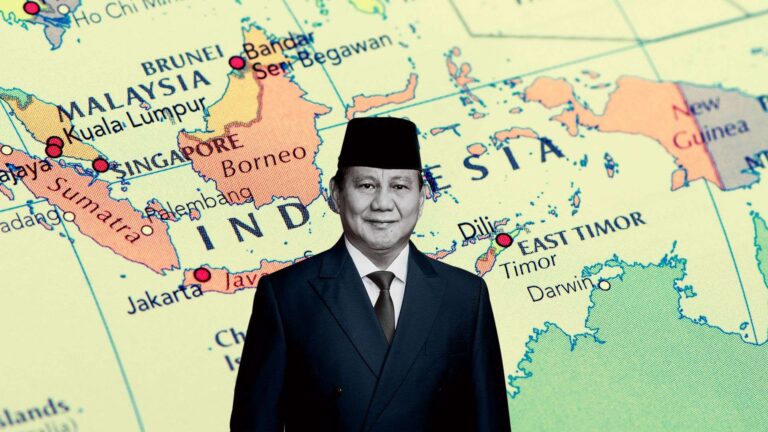On April 1, 2024, Indonesia’s President-elect Prabowo Subianto visited Beijing at the invitation of Chinese President Xi Jinping. Having secured the presidency through indirect but questionable means on February 14, 2024, Prabowo immediately expressed a willingness to cooperate with China.
While Indonesia also values its relations with Japan and Malaysia, its relationship with China cannot be overemphasized. Not only is China investing heavily in Indonesia’s infrastructure and connectivity projects, but the growing US-China conflict and China’s continued belligerence in the South China Sea put Indonesia in a precarious position. With three of the world’s most important chokepoints – the Straits of Malacca, Lombok and Sumba – it is no exaggeration to say that Indonesia is the most geopolitically important region in any conflict in the Indo-Pacific.
China’s foreign policy is typically about capturing elites, and Prabowo’s election victory immediately made the former military general a target for President Xi Jinping, whose main purpose in inviting Prabowo was to ask him whether he would maintain the same stance toward China as Indonesia’s current president, Joko “Jokowi” Widodo.
President Jokowi, whose term ends in October 2024, has visited China eight times in 10 years and met with President Xi Jinping 12 times. In addition to promoting trade expansion, President Jokowi has signed numerous infrastructure deals with China. But the roots of these investments go back longer than President Jokowi himself. Between 2000 and 2017, Indonesia was the fourth-largest recipient of Chinese foreign direct investment, receiving $4.42 billion, and the sixth-largest recipient of other official funds, receiving $29.96 billion.
As of 2021, Indonesia’s government debt to China was $4.95 billion, but $17.28 billion in “hidden” public debt – debt owed by Indonesian state-owned enterprises – was not recorded on the government’s books. As a result, 78% of Indonesia’s debt to China was not backed by government guarantees in 2021.
Prabowo should therefore limit Indonesia’s growing debt to China, but he is likely to maintain the same stance on China as Jokowi.
Indonesia does not have a coherent China policy. Rather, it is a personality-driven relationship. And Prabowo’s term will be an extension of Jokowi’s. In fact, Prabowo ran for the presidency alongside Jokowi’s son, Gibran Rakabuming Raka. However, Gibran was only deemed eligible to run after the Indonesian Constitutional Court (then headed by Gibran’s uncle Anwar Usman) amended the country’s 2017 General Election Law, making the 36-year-old Gibran eligible to run. The General Election Law stipulated that the minimum age for candidates was 40, but the justification was fabricated because he was already in public office.
Prabowo lost to Jokowi in 2014 and 2019 and was not even the leading candidate for the presidential election in October 2023. Prabowo’s landslide victory is evidence that his own presidential legitimacy comes mainly from his newfound rapport with Jokowi. Not surprisingly, Jokowi himself is calling for “synchronization” of the plans of the outgoing administration and those of the incoming Prabowo and Gibran.
Prabowo is therefore unlikely to change his policy towards China, in contrast to Philippine President Ferdinand Marcos Jr., whose decision to stand up to China differed from that of his predecessor, Rodrigo Duterte. Duterte’s sister, Sara, is Marcos’ vice president, but Marcos does not have a good relationship with her due to their differences with their predecessor.
Indonesia is already deeply engaged with China, and is second only to Pakistan in the number of Chinese-funded infrastructure projects already underway, with projects valued at $20.3 billion. Indonesia has the same number of projects as Pakistan, with 71, and behind Cambodia, with 82.
In 2022, bilateral trade between Indonesia and China will reach $149.1 billion, up 19.8% year-on-year, with China investing $8.2 billion, making it Indonesia’s second-largest investor. In July 2023, China pledged to provide an additional $44.89 billion to Indonesia, and in September it pledged to provide another $21.7 billion.
Prabowo would be foolish to think that China would never try to use its debt to undermine Indonesia’s official non-aligned position.
At the same time, Prabowo has shown no signs of restricting Chinese investment. For example, in November 2023, Prabowo defended the Chinese-funded development of Lempang Eco-City, an industrial park where indigenous land was forcibly expropriated to make way for Chinese-owned glass and solar panel manufacturing facilities. After local residents demonstrated against the proposed conversion of their homes into a foreign-funded industrial park, Prabowo blurred the lines by blaming meddling foreign agents for the unrest.
Third, Indonesia’s navy is small compared to China’s. Indonesia is made up of 18,000 islands and 5 million square kilometers of ocean, but its navy only has four submarines. There are many plans to more than double the fleet, but the current Defense Minister, Prabowo, has not yet decided to build submarines. While Prabowo has said Indonesia’s maritime sovereignty is non-negotiable, the truth is that it is Indonesia’s unspoken policy to do whatever it can to prevent conflict and maintain the status quo in the region. So far, it has achieved this through closed-door talks and dialogue with China.
Whether China actually intends to go to war with Taiwan to “unify” it remains a matter of speculation. China may simply want to be recognized as a regional hegemon, regardless of the UNCLOS, and maintain access to the South China Sea. Some sources say that it is highly unlikely that China will invade Taiwan. However, rumors abound that Xi Jinping may launch a “unification” campaign as early as 2025.
Simply put, Indonesia has no coherent China policy, and it is highly unlikely that policy will change under Prabowo’s administration. Even if China invades Taiwan, there is little Indonesia can do other than call for an end to the conflict.
This article was originally published on East Asia Forum.
Daniel Peterson is a lecturer in Southeast Asian politics at Queen’s University London, where he studies Islamic politics, Indonesia, and Indonesia-China relations.


